Zikai Zhang
On the Out-of-Distribution Backdoor Attack for Federated Learning
Sep 16, 2025Abstract:Traditional backdoor attacks in federated learning (FL) operate within constrained attack scenarios, as they depend on visible triggers and require physical modifications to the target object, which limits their practicality. To address this limitation, we introduce a novel backdoor attack prototype for FL called the out-of-distribution (OOD) backdoor attack ($\mathtt{OBA}$), which uses OOD data as both poisoned samples and triggers simultaneously. Our approach significantly broadens the scope of backdoor attack scenarios in FL. To improve the stealthiness of $\mathtt{OBA}$, we propose $\mathtt{SoDa}$, which regularizes both the magnitude and direction of malicious local models during local training, aligning them closely with their benign versions to evade detection. Empirical results demonstrate that $\mathtt{OBA}$ effectively circumvents state-of-the-art defenses while maintaining high accuracy on the main task. To address this security vulnerability in the FL system, we introduce $\mathtt{BNGuard}$, a new server-side defense method tailored against $\mathtt{SoDa}$. $\mathtt{BNGuard}$ leverages the observation that OOD data causes significant deviations in the running statistics of batch normalization layers. This allows $\mathtt{BNGuard}$ to identify malicious model updates and exclude them from aggregation, thereby enhancing the backdoor robustness of FL. Extensive experiments across various settings show the effectiveness of $\mathtt{BNGuard}$ on defending against $\mathtt{SoDa}$. The code is available at https://github.com/JiiahaoXU/SoDa-BNGuard.
Majority Bit-Aware Watermarking For Large Language Models
Aug 05, 2025Abstract:The growing deployment of Large Language Models (LLMs) in real-world applications has raised concerns about their potential misuse in generating harmful or deceptive content. To address this issue, watermarking techniques have emerged as a promising solution by embedding identifiable binary messages into generated text for origin verification and misuse tracing. While recent efforts have explored multi-bit watermarking schemes capable of embedding rich information such as user identifiers, they typically suffer from the fundamental trade-off between text quality and decoding accuracy: to ensure reliable message decoding, they have to restrict the size of preferred token sets during encoding, yet such restrictions reduce the quality of the generated content. In this work, we propose MajorMark, a novel watermarking method that improves this trade-off through majority bit-aware encoding. MajorMark selects preferred token sets based on the majority bit of the message, enabling a larger and more flexible sampling of tokens. In contrast to prior methods that rely on token frequency analysis for decoding, MajorMark employs a clustering-based decoding strategy, which maintains high decoding accuracy even when the preferred token set is large, thus preserving both content quality and decoding accuracy. We further introduce MajorMark$^+$, which partitions the message into multiple blocks to independently encode and deterministically decode each block, thereby further enhancing the quality of watermarked text and improving decoding accuracy. Extensive experiments on state-of-the-art LLMs demonstrate that our methods significantly enhance both decoding accuracy and text generation quality, outperforming prior multi-bit watermarking baselines.
Fed-HeLLo: Efficient Federated Foundation Model Fine-Tuning with Heterogeneous LoRA Allocation
Jun 13, 2025Abstract:Federated Learning has recently been utilized to collaboratively fine-tune foundation models across multiple clients. Notably, federated low-rank adaptation LoRA-based fine-tuning methods have recently gained attention, which allows clients to fine-tune FMs with a small portion of trainable parameters locally. However, most existing methods do not account for the heterogeneous resources of clients or lack an effective local training strategy to maximize global fine-tuning performance under limited resources. In this work, we propose Fed-HeLLo, a novel federated LoRA-based fine-tuning framework that enables clients to collaboratively fine-tune an FM with different local trainable LoRA layers. To ensure its effectiveness, we develop several heterogeneous LoRA allocation (HLA) strategies that adaptively allocate local trainable LoRA layers based on clients' resource capabilities and the layer importance. Specifically, based on the dynamic layer importance, we design a Fisher Information Matrix score-based HLA that leverages dynamic gradient norm information. To better stabilize the training process, we consider the intrinsic importance of LoRA layers and design a Geometrically-Defined HLA strategy. It shapes the collective distribution of trainable LoRA layers into specific geometric patterns, such as Triangle, Inverted Triangle, Bottleneck, and Uniform. Moreover, we extend GD-HLA into a randomized version, named Randomized Geometrically-Defined HLA, for enhanced model accuracy with randomness. By co-designing the proposed HLA strategies, we incorporate both the dynamic and intrinsic layer importance into the design of our HLA strategy. We evaluate our approach on five datasets under diverse federated LoRA fine-tuning settings, covering three levels of data distribution from IID to extreme Non-IID. Results show that Fed-HeLLo with HLA strategies is both effective and efficient.
Traceable Black-box Watermarks for Federated Learning
May 19, 2025Abstract:Due to the distributed nature of Federated Learning (FL) systems, each local client has access to the global model, posing a critical risk of model leakage. Existing works have explored injecting watermarks into local models to enable intellectual property protection. However, these methods either focus on non-traceable watermarks or traceable but white-box watermarks. We identify a gap in the literature regarding the formal definition of traceable black-box watermarking and the formulation of the problem of injecting such watermarks into FL systems. In this work, we first formalize the problem of injecting traceable black-box watermarks into FL. Based on the problem, we propose a novel server-side watermarking method, $\mathbf{TraMark}$, which creates a traceable watermarked model for each client, enabling verification of model leakage in black-box settings. To achieve this, $\mathbf{TraMark}$ partitions the model parameter space into two distinct regions: the main task region and the watermarking region. Subsequently, a personalized global model is constructed for each client by aggregating only the main task region while preserving the watermarking region. Each model then learns a unique watermark exclusively within the watermarking region using a distinct watermark dataset before being sent back to the local client. Extensive results across various FL systems demonstrate that $\mathbf{TraMark}$ ensures the traceability of all watermarked models while preserving their main task performance.
ROMA: a Read-Only-Memory-based Accelerator for QLoRA-based On-Device LLM
Mar 17, 2025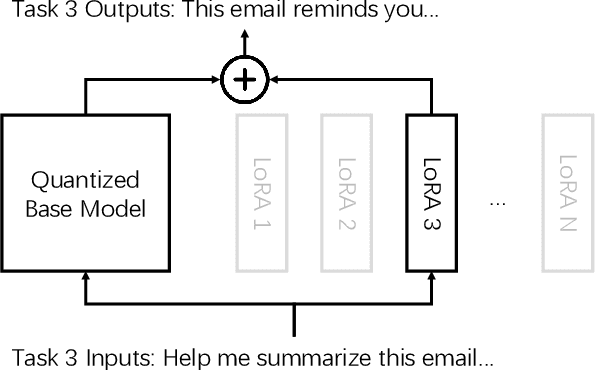
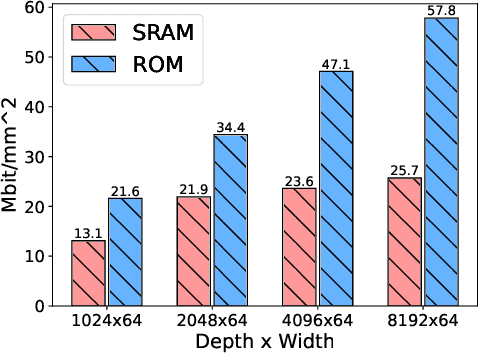
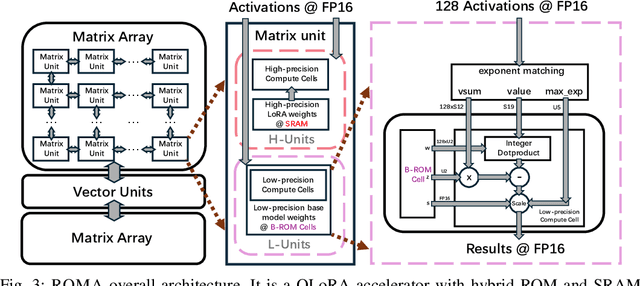
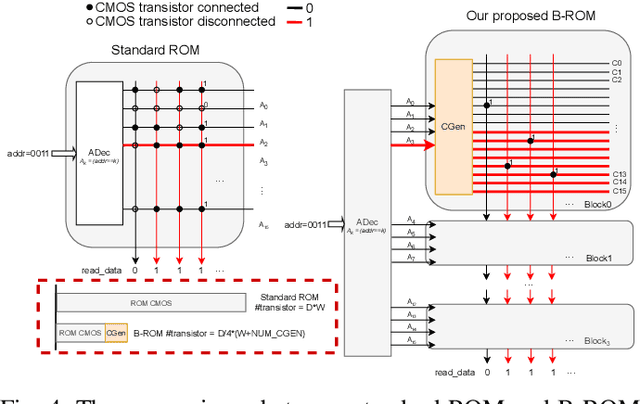
Abstract:As large language models (LLMs) demonstrate powerful capabilities, deploying them on edge devices has become increasingly crucial, offering advantages in privacy and real-time interaction. QLoRA has emerged as the standard approach for on-device LLMs, leveraging quantized models to reduce memory and computational costs while utilizing LoRA for task-specific adaptability. In this work, we propose ROMA, a QLoRA accelerator with a hybrid storage architecture that uses ROM for quantized base models and SRAM for LoRA weights and KV cache. Our insight is that the quantized base model is stable and converged, making it well-suited for ROM storage. Meanwhile, LoRA modules offer the flexibility to adapt to new data without requiring updates to the base model. To further reduce the area cost of ROM, we introduce a novel B-ROM design and integrate it with the compute unit to form a fused cell for efficient use of chip resources. ROMA can effectively store both a 4-bit 3B and a 2-bit 8B LLaMA model entirely on-chip, achieving a notable generation speed exceeding 20,000 tokens/s without requiring external memory.
Detecting Backdoor Attacks in Federated Learning via Direction Alignment Inspection
Mar 11, 2025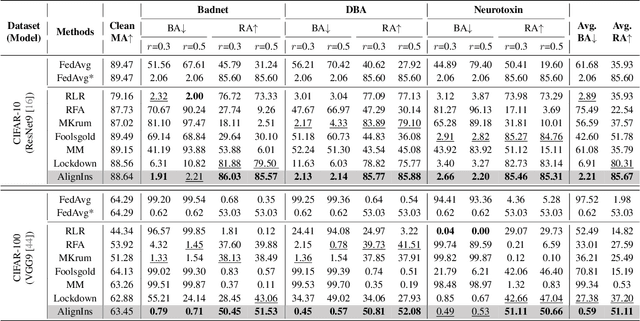
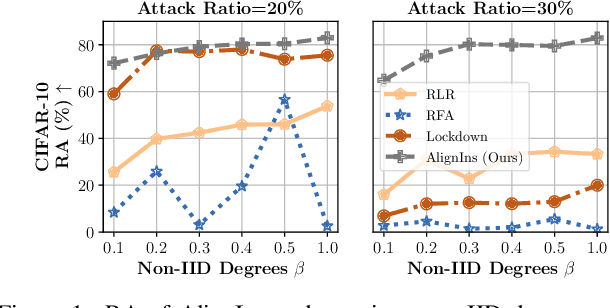


Abstract:The distributed nature of training makes Federated Learning (FL) vulnerable to backdoor attacks, where malicious model updates aim to compromise the global model's performance on specific tasks. Existing defense methods show limited efficacy as they overlook the inconsistency between benign and malicious model updates regarding both general and fine-grained directions. To fill this gap, we introduce AlignIns, a novel defense method designed to safeguard FL systems against backdoor attacks. AlignIns looks into the direction of each model update through a direction alignment inspection process. Specifically, it examines the alignment of model updates with the overall update direction and analyzes the distribution of the signs of their significant parameters, comparing them with the principle sign across all model updates. Model updates that exhibit an unusual degree of alignment are considered malicious and thus be filtered out. We provide the theoretical analysis of the robustness of AlignIns and its propagation error in FL. Our empirical results on both independent and identically distributed (IID) and non-IID datasets demonstrate that AlignIns achieves higher robustness compared to the state-of-the-art defense methods. The code is available at https://github.com/JiiahaoXU/AlignIns.
Identify Backdoored Model in Federated Learning via Individual Unlearning
Nov 01, 2024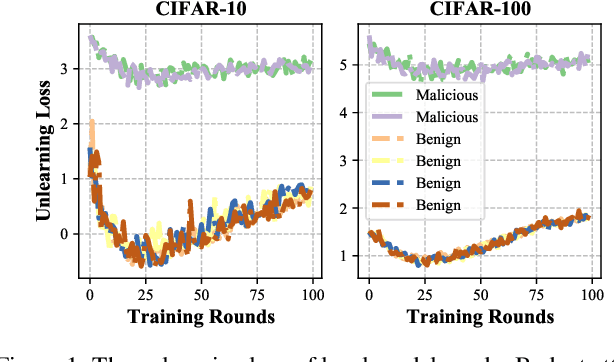
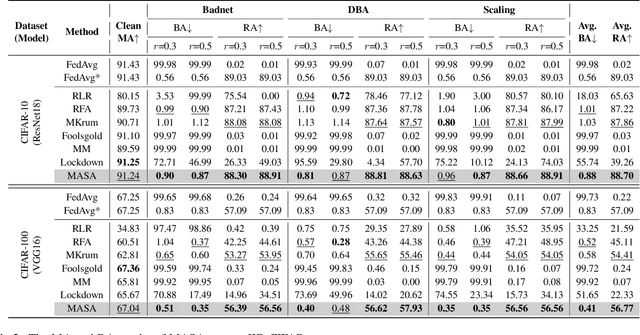
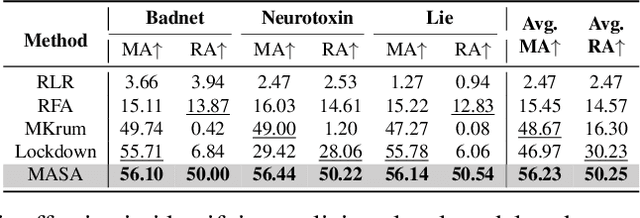
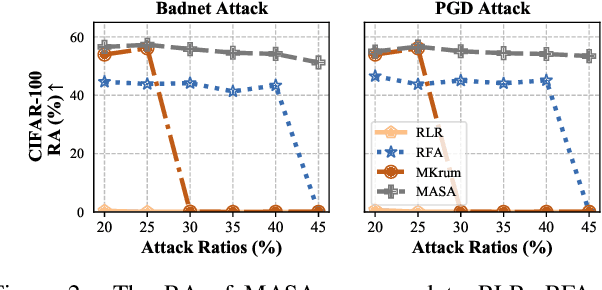
Abstract:Backdoor attacks present a significant threat to the robustness of Federated Learning (FL) due to their stealth and effectiveness. They maintain both the main task of the FL system and the backdoor task simultaneously, causing malicious models to appear statistically similar to benign ones, which enables them to evade detection by existing defense methods. We find that malicious parameters in backdoored models are inactive on the main task, resulting in a significantly large empirical loss during the machine unlearning process on clean inputs. Inspired by this, we propose MASA, a method that utilizes individual unlearning on local models to identify malicious models in FL. To improve the performance of MASA in challenging non-independent and identically distributed (non-IID) settings, we design pre-unlearning model fusion that integrates local models with knowledge learned from other datasets to mitigate the divergence in their unlearning behaviors caused by the non-IID data distributions of clients. Additionally, we propose a new anomaly detection metric with minimal hyperparameters to filter out malicious models efficiently. Extensive experiments on IID and non-IID datasets across six different attacks validate the effectiveness of MASA. To the best of our knowledge, this is the first work to leverage machine unlearning to identify malicious models in FL. Code is available at \url{https://github.com/JiiahaoXU/MASA}.
Fed-piLot: Optimizing LoRA Assignment for Efficient Federated Foundation Model Fine-Tuning
Oct 14, 2024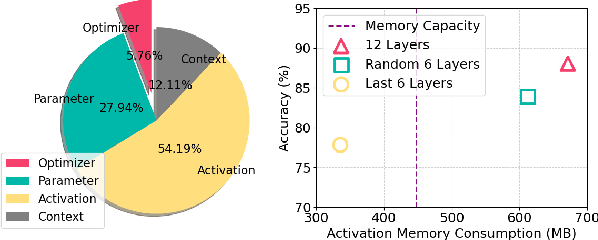
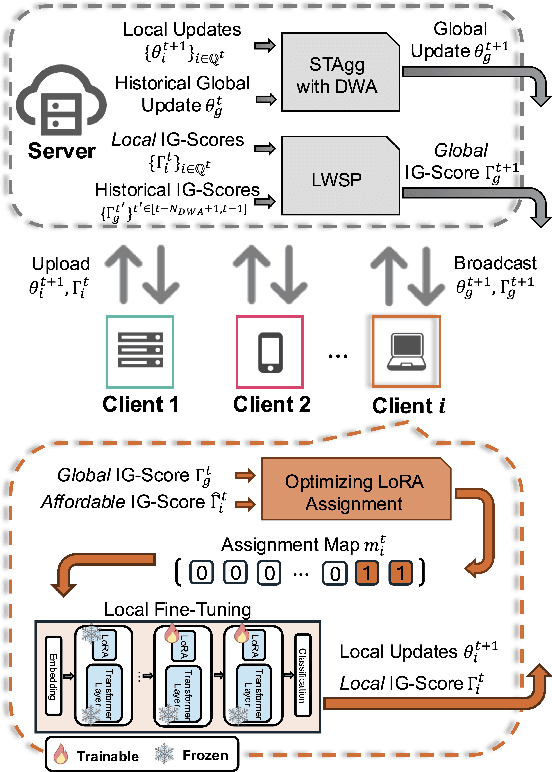

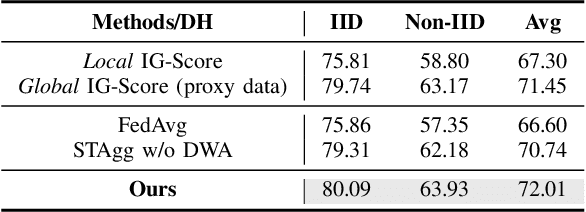
Abstract:Foundation models (FMs) have shown remarkable advancements in enhancing the performance of intelligent applications. To address the need for data privacy in FM fine-tuning, federated learning has emerged as the de facto framework. Specifically, Federated FMs (FedFMs) fine-tuning using low-rank adaptation (LoRA) modules instead of the full model over multiple clients can achieve both parameter efficiency and data privacy. However, recent studies rarely address the challenges posed by clients with heterogeneous resources, particularly in GPU memory capacity. In this paper, we introduce Fed-piLot, an efficient FedFM fine-tuning framework with optimized local LoRA assignments for heterogeneous clients. By emphasizing the different memory consumption for training different LoRA layers, as well as the varying contributions of different layers to model performance, we formulate the LoRA assignment as a Knapsack Optimization Problem. We design a Local-Global Information Gain Score (IG-Score) based value function to optimize LoRA assignment under clients' memory constraints. To further mitigate the impact of heterogeneity in model updates, we propose a novel Spatial-Temporal model aggregation (STAgg) rule using the Dynamic Weight Adjustment (DWA) strategy. Experimental results on three datasets under both IID and non-IID conditions demonstrate the effectiveness and efficiency of Fed-piLot. The code will be publicly available.
Federated Learning for Smart Grid: A Survey on Applications and Potential Vulnerabilities
Sep 16, 2024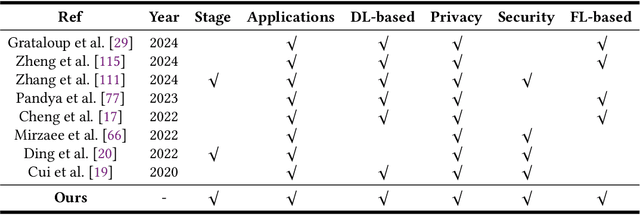

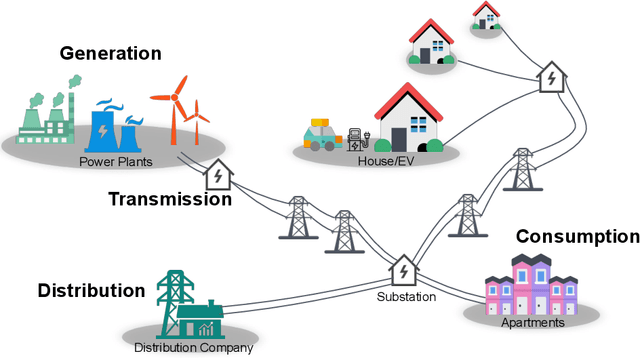

Abstract:The Smart Grid (SG) is a critical energy infrastructure that collects real-time electricity usage data to forecast future energy demands using information and communication technologies (ICT). Due to growing concerns about data security and privacy in SGs, federated learning (FL) has emerged as a promising training framework. FL offers a balance between privacy, efficiency, and accuracy in SGs by enabling collaborative model training without sharing private data from IoT devices. In this survey, we thoroughly review recent advancements in designing FL-based SG systems across three stages: generation, transmission and distribution, and consumption. Additionally, we explore potential vulnerabilities that may arise when implementing FL in these stages. Finally, we discuss the gap between state-of-the-art FL research and its practical applications in SGs and propose future research directions. These focus on potential attack and defense strategies for FL-based SG systems and the need to build a robust FL-based SG infrastructure. Unlike traditional surveys that address security issues in centralized machine learning methods for SG systems, this survey specifically examines the applications and security concerns in FL-based SG systems for the first time. Our aim is to inspire further research into applications and improvements in the robustness of FL-based SG systems.
Achieving Byzantine-Resilient Federated Learning via Layer-Adaptive Sparsified Model Aggregation
Sep 02, 2024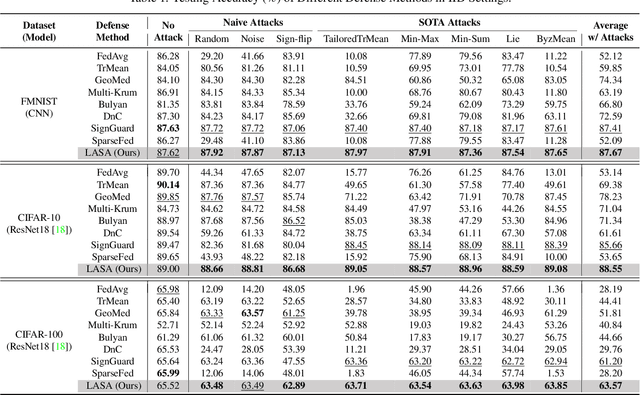
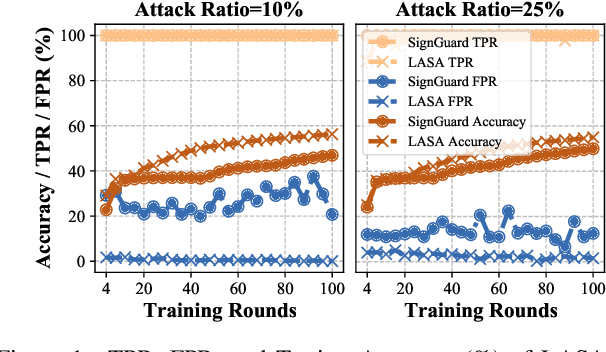
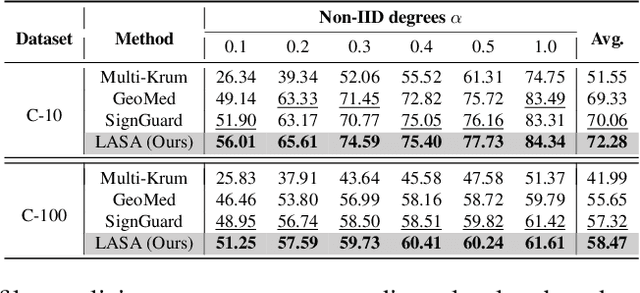
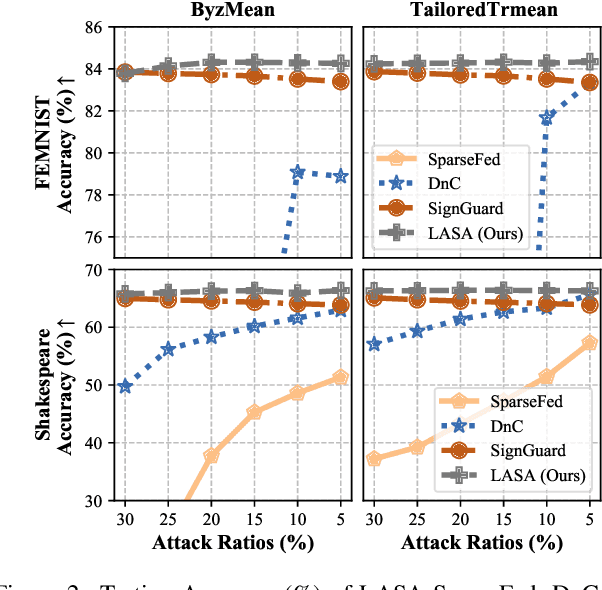
Abstract:Federated Learning (FL) enables multiple clients to collaboratively train a model without sharing their local data. Yet the FL system is vulnerable to well-designed Byzantine attacks, which aim to disrupt the model training process by uploading malicious model updates. Existing robust aggregation rule-based defense methods overlook the diversity of magnitude and direction across different layers of the model updates, resulting in limited robustness performance, particularly in non-IID settings. To address these challenges, we propose the Layer-Adaptive Sparsified Model Aggregation (LASA) approach, which combines pre-aggregation sparsification with layer-wise adaptive aggregation to improve robustness. Specifically, LASA includes a pre-aggregation sparsification module that sparsifies updates from each client before aggregation, reducing the impact of malicious parameters and minimizing the interference from less important parameters for the subsequent filtering process. Based on sparsified updates, a layer-wise adaptive filter then adaptively selects benign layers using both magnitude and direction metrics across all clients for aggregation. We provide the detailed theoretical robustness analysis of LASA and the resilience analysis for the FL integrated with LASA. Extensive experiments are conducted on various IID and non-IID datasets. The numerical results demonstrate the effectiveness of LASA. Code is available at \url{https://github.com/JiiahaoXU/LASA}.
 Add to Chrome
Add to Chrome Add to Firefox
Add to Firefox Add to Edge
Add to Edge